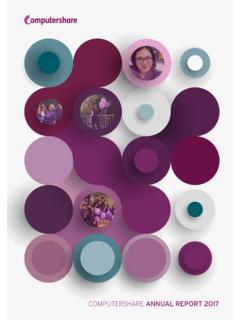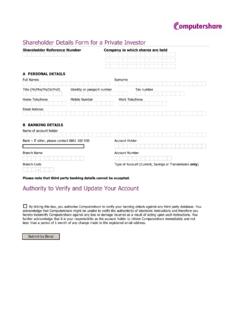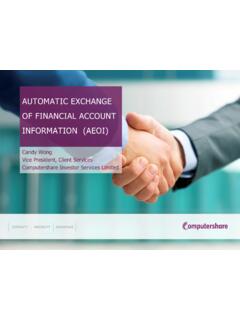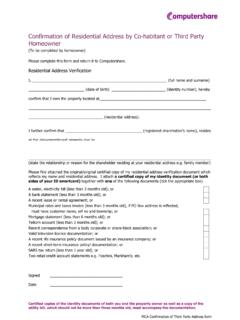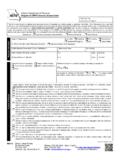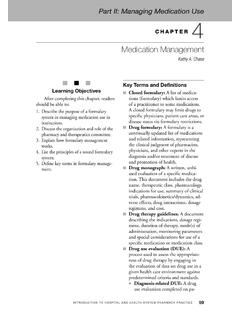Transcription of Transfer Agent Overview - Computershare
1 Transfer Agent Overviewcertaintyingenuityadvantage 2 > ComputershareTransfer Agent OverviewContentsExecutive summary 3 What is stock? 3 Registered and beneficial shareholders 4 Recordkeeping and the Transfer Agent 5 Transfer Agent regulations 5 Book entry and printed certificates 7 Dividends 7 Dividend reinvestment plans (DRP) and direct stock purchase plans (DSPP) 7 Waiver plans 8 Transferring shares 8 Lost certificates 8 Sales of shares 8 The Depository Trust Company (DTC) 8 Fast Automated Securities Transfer (FAST) system 9 Deposit or Withdrawal by Custodian (DWAC) 9 Direct Registration System (DRS) 9 Lost shareholders, abandoned property and escheatment 9 Unclaimed property audits 10 Corporate actions 10 Annual meetings 11 Proxy materials 11 Proxy statement 11 Proxy card and other voting mechanisms 11 Notice and access 12 Delivery of proxy materials 12 Full-set mailing 12 Notice-only mailing 13 Fulfillment requests for notice-only mailings 13 Hybrid notice and access models 13 Delivery preferences and electronic delivery 13 Householding 13 Proxy solicitation 14 Vote tabulation 14 Section 16 form filing for insiders 15 Key industry organizations 153 > ComputershareTransfer Agent OverviewExecutive summaryThis white paper is intended to give a high-level Overview
2 Of Transfer agency, with definitions and descriptions of commonly used terms and processes, such as: >Registered and beneficial shareholders >The Depository Trust Company (DTC) and its nominee, Cede & Co. >Notice and access >Book-entry and printed stock certificates >Escheatment and lost shareholdersWhat is stock?Stock represents the ownership in a company, shares of which may be held by individuals, fiduciaries or entities. The first time a company offers the sale of stock to the public is referred to as an initial public offering (IPO) or going public. Stock issuances by companies are governed by the Securities Act of 1933 and the Securities Exchange Act of 1934, and regulations thereunder, which are enforced by the United States Securities and Exchange Commission (SEC). Issuers are also subject to the corporate law of the company s state of incorporation, the rules of the exchange on which its stock is traded, operational guidelines and eligibility requirements of The Depository Trust Company (DTC), if eligible) and the issuers corporate by-laws, articles of incorporation and other corporate governing documents.
3 Corporations may issue different classes of stock, which may be subject to different ownership rules, value per share and privileges such as the right to vote on certain corporate matters. These classes of stock include the following: >Common stock, which allows the holder to vote on matters of corporate policy and the composition of the board of directors. If a company goes bankrupt or is otherwise liquidated, common-stock holders claims generally are subordinate to bondholders or preferred stockholders claims. Common stock may be sold on a stock market, and its holders are entitled to a dividend if the company s board of directors approves a dividend payment to holders of common stock. >Preferred stock, which the corporation may or may not choose to issue, can offer certain financial advantages over common stock.
4 Preferred stock usually does not confer voting rights, but generally pays a fixed dividend before dividends are paid to common stock holders. In case of the company s bankruptcy or liquidation, holders of preferred stock generally take priority over common stock holders. Conditions and privileges associated with holding preferred stock vary by each company. Frequently, preferred stock allows holders to convert their shares to common stock. > restricted stock is subject to restrictions on Transfer , purchase and resale, generally because of its registration status with the SEC or due to contractual restrictions. It is commonly awarded as a form of employee compensation or as part of a merger or acquisition and may not be sold or transferred until certain conditions have been met. > restricted stock units represent shares of restricted stock to be issued under specific conditions, and are commonly used as a form of employee compensation.
5 At the time units are awarded there are no actual shares. Units can be converted to shares of common stock under certain conditions, such as vesting requirements. The stock for publicly traded companies may be traded on one of the 22 exchanges registered with the SEC in the United States listed below: >BATS Exchange, Inc. >BATS Y-Exchange, Inc. >BOX Options Exchange LLC >Board of Trade of the City of Chicago, Inc. >C2 Options Exchange, Inc. >CBOE Futures Exchange, LLC >Chicago Board Options Exchange, Inc. (CBOE) >Chicago Mercantile Exchange >Chicago Stock Exchange, Inc. (CHX) >EDGA Exchange, Inc. >EDGX Exchange, Inc. >International Securities Exchange, LLC (ISE) >The Island Futures Exchange, LLC >The Nasdaq Stock Market LLC >NASDAQ OMX BX, Inc. (formerly the Boston Stock Exchange) >NASDAQ OMX PHLX, Inc.
6 (formerly Philadelphia Stock Exchange, Inc.) >National Stock Exchange, Inc. (NSX , formerly known as the Cincinnati Stock Exchange) >New York Stock Exchange LLC (NYSE ) >NQLX LLC >NYSE Arca, Inc. >NYSE MKT LLC (formerly NYSE AMEX and the American Stock Exchange) >One Chicago, LLCA dditionally, many equity securities, corporate bonds, government securities and certain derivative products are traded in the over-the-counter (OTC) market, through systems such as the OTC Bulletin Board (OTCBB) or Pink Sheets. 4 > ComputershareTransfer Agent OverviewThe OTCBB is an electronic system for OTC securities that are not listed on a national securities exchange. Under the OTCBB s eligibility rule, companies that want to have their securities quoted on the OTCBB must file current financial reports with the SEC or with their banking or insurance regulators.
7 Pink Sheets is the name of another electronic system for OTC securities that are not listed on a national securities exchange. The name is derived from the color of paper used when the sheets previously circulated in hard copy. To be quoted on the Pink Sheets, a company does not need to meet any listing stockAuthorized stock is the stock, limited to a fixed amount, the corporation may legally issue, pursuant to its corporate charter. The amount of authorized stock a corporation may issue never changes, unless the charter or articles of incorporation or other appropriate governing document is modified. Such modifications may require shareholder and unissued stockIssued-and-outstanding shares are shares of authorized common stock issued to shareholders. Unissued shares are authorized shares of common stock not yet issued by the corporation and held in reserve for future use, such as for a secondary issuance, stock options or stockTreasury stock consists of shares that have already been issued, but have been bought back from the shareholders by the corporation.
8 These shares are considered issued but not outstanding. Some states ( , Massachusetts) may not recognize the validity of treasury offeringsIn addition to shares sold to the public during an IPO, companies may choose to offer additional stock, subsequent to the IPO. Post-IPO mass sales are known as secondary offerings: Proceeds go to the company. Other activities by the issuer, such as employee stock purchase plans, stock options and company awards, may require and beneficial shareholdersThere are two types of shareholders: registered and beneficial. Registered shareholders, also known as shareholders of record, are people, groups or entities that hold shares directly in their own name on the company register. The issuer, or its Transfer Agent , then keeps the records of ownership for the shareholder and provides services such as transferring shares, paying dividends, coordinating shareholder communications and more, as described below.
9 Beneficial shareholders have their stock held in the name of an intermediary such as a broker. The broker then is able to facilitate trading shares and other services for the shareholders. When shares are kept in this manner, it is often referred to as keeping the shares in street name. The vast majority of shareholders are beneficial outstanding (includes treasury stock)UnissuedstockTypes of corporate stockTypes of authorized stockIssued stockRegistered shareholdersServiced by Transfer agentServiced by brokerNOBOsOBOsBeneficial shareholdersRegistered and Beneficial Shareholder Servicing5 > ComputershareTransfer Agent OverviewAdditionally, beneficial owners are designated as objecting beneficial owners (OBOs) or non-objecting beneficial owners (NOBOs). By objecting, OBOs shield their identity from the issuer and may only be contacted by the issuer via a third party, such as the holder s broker.
10 NOBOs waive this right and may be contacted directly by the issuer, including shareholder communications such as proxy statements and annual/quarterly reports. Lists for an issuer s NOBOs may be requested from an a shareholder opens a brokerage account and has his or her securities put in street name, the broker is required to give the shareholder the opportunity to designate themselves as an OBO or NOBO. If the shareholder does not elect to be a NOBO, he or she will often by default be listed by the intermediary as an OBO. Recordkeeping and the Transfer agentTransfer agents maintain a record of ownership, including contact information, of an issuer s registered shareholders. Brokers maintain the records of beneficial agents responsibilities also include the Transfer , issuance and cancellation of an issuer s shares.
